September/October 2021
Dear friends,
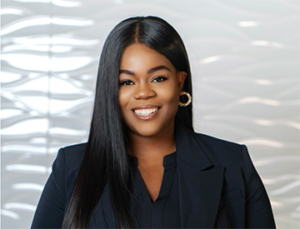 We hope this publication of the Fellow’s flyer finds you and your family doing well! Here at Princeton in Africa, we are looking forward to the winter months and are thrilled to share with you all the exciting work we have done in September and October.
We hope this publication of the Fellow’s flyer finds you and your family doing well! Here at Princeton in Africa, we are looking forward to the winter months and are thrilled to share with you all the exciting work we have done in September and October.
First, I am delighted to be joining Princeton in Africa as the Executive Director at such an exciting moment in our commitment to a more ethical and responsible engagement with the continent. PiAf is an exceptional organization dedicated to developing future leaders as they contribute to some of the most impactful organizations in Africa today. We enable our Fellows, through their work, to make significant contributions to Africa’s well-being, and we encourage our Fellows to cultivate meaningful relationships with communities in Africa and with one another.
As the application window is coming to a close (our deadline is October 27th), we are excited to begin reviewing applications and start selecting a new class of bright, talented, and passionate young leaders dedicated to the advancement of the African continent.
Well into the first few months of their fellowships, the 2021-2022 Fellows have settled into their roles and are excited about the work they are doing. We have arranged our first couple of Instagram Takeovers, where Fellows give an overview of their organization, their work, and their daily lives through Instagram stories. Make sure you are following our Princeton in Africa Instagram so you never miss any updates from the Fellows!
We’re so happy that our current and previous remote fellowships have been rich and valuable to our Fellows, and we’re so proud to say that our host organizations are blown away by their work. During our 2020-2021 fellowship year, 100% of our host organizations declared that their Fellows’ skills and knowledge were suitable for the position and for the organization, and 100% said that they would like to host another PiAf Fellow in the future.
Looking to the future, our resources for 2022-2023 PiAf applicants have been substantial, with an Instagram live session held on September 20th, our yearly informational session held on September 21st, and virtual office hours throughout late September and October. During our Instagram live, we were so happy to receive great enthusiasm from our viewers and insightful questions that hopefully helped those interested navigate the application process.
We have held some excellent panels over the last two months, namely our second annual Black Alumni Panel, and a Professional Sector Overview Panel. Both of these panels gave an amazing insight into the lives and careers of Princeton in Africa alumni. Prospective applicants had the opportunity to learn about identity as it relates to the African continent, the vast interests and career aspirations of our alumni, and vital tips for applying and being successful as a possible Fellow.
Lastly, our previous Outreach Coordinator, Ruba, has made it to London to start her journey to receive her MSc at The London School of Economics. We welcome our new Outreach Coordinator, Katie Testa. Read about her on our website!
We want to extend a warm thank you to all the alumni, donors, and friends who offer continuous support to the Fellows and host organizations.
Best regards,
Damilola and The PiAf team
PiAf Connections
Please click below to check out pictures of our Fellows, Alums and other members of the PiAf family meeting up at home and around Africa.
Notes from the Field
By Edwina Owusu-Adjapong, '21-'22 Fellow with BIPAI in Eswatini
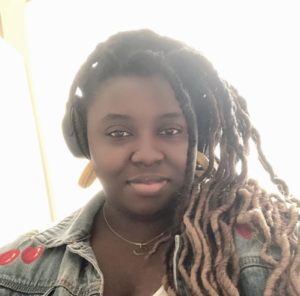
Relief after successfully submitting a grant application.
The 3-day-long PiAf zoom orientation started on June 4th. Each day, from 13:00 GMT to 18:00 GMT, I joined orientation from my family’s living room in Kumasi, Ghana, which has since become my dedicated work-from-home space. I met and bonded with 22 other fellows, who, like me, were equal parts excited and apprehensive about the prospects of their fellowships. Our conversations reassured me that I was not alone in not knowing what to expect in my remote fellowship and that I’d have a support system in place as I navigated this year-long commitment. I enjoyed learning about each person and getting glimpses into their lives.
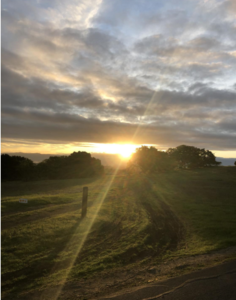
Getting my daily dose of Vitamin D.
The orientation itself gave me a lot to think about. The segments on identity and mindfulness, and resilience were compelling in helping me gain some introspection. Since then, I have consistently sought to create some time alone to listen to and nurture myself.
I started my fellowship with the Baylor International Pediatric AIDS Initiative – Eswatini (BIPAI Eswatini) on Jul 1, 2021. During this time, Eswatini was in the middle of a government-imposed and military-enforced nationwide lockdown in response to protests against the government and the royal family. Our offices were closed, internet services in Eswatini were shut down, and I had no way of reaching my supervisor. Through this all, PiAf staff and Trina, the then outgoing PiAf fellow at BIPAI Eswatini, were very supportive. She and PiAf staff would also give me updates whenever they got any news from connections at Baylor Eswatini. Trina also briefed me on all our projects and deadlines, and we got to work on our grant applications whose deadlines were impending. I came into the position without any tangible grant writing experience, and my first month presented a steep learning curve. Nonetheless, I cherish this experience because not only did I learn a lot about grant writing, but I also gained insight into how the work we do at Baylor Eswatini improves the lives of children living with HIV in Eswatini and that of their families.
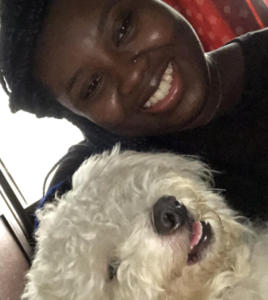
Spending quality time with Diego, my trusty WFH companion.
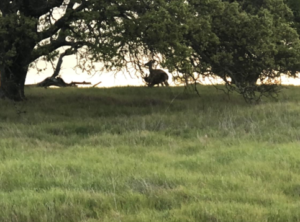
A doe and her fawn eating some leaves. I see so many exciting things during my morning walks!
I have since met my supervisor and colleagues and have started getting to know and forge friendships with them. I have worked on numerous projects and applied to several grants on behalf of Baylor Eswatini. I have also met people from across the BIPAI network and taken the lead in coordinating and publishing a monthly network-wide newsletter, drawing on artistic skills that I did not even know I had before the start of this fellowship.
While working remotely has not been easy, I have found that my colleagues on-site are welcoming and willing to share their lives with me. It has also helped that I do not have a significant time difference, Eswatini being only 2 hours ahead of Ghana. In all, I have had a positive fellowship experience thus far, and I am excited to see what the rest of the year brings!
Notes from the Field
By Kathryn Latham, '21-'22 Fellow with IRC in Sierra Leone
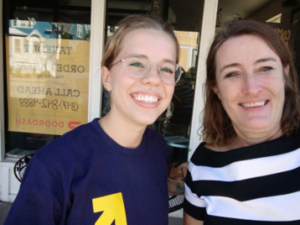
My supervisor and me at lunch while she was in Chicago.
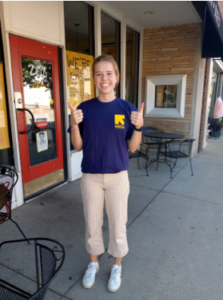
New IRC shirt!
Hi everyone, and greetings from Chicago! My name is Katie Latham, and I am doing my remote fellowship at the International Rescue Committee (IRC) Sierra Leone as a Grants Fellow.
My tasks change day-to-day based on what needs to get done, but, in general, I work on reviewing reports and making sure our grants are implemented in compliance with donor regulations and IRC procedures. My favorite part of my fellowship has been reading the monthly reports because it allows me to see a glimpse into the incredible work the IRC is doing from miles away.
Although I wish I could be in Freetown, the capital of Sierra Leone, working remotely has allowed me to travel and see family and friends throughout the United States. I am grateful for the flexibility that comes with working from home! I appreciate how I can easily get up from my desk and find a change in the scenery. This freedom has allowed me the opportunity to break up the repetitiveness that could come with working from home.
An exciting surprise of my fellowship is that one of my supervisors recently visited family in the Chicago area, so I was able to meet up with her for lunch. She brought back an IRC shirt, and throughout our lunch, showed me pictures of Sierra Leone. I am hoping that one day I can experience being in the country in person. But, for now, I’ll be supporting and cheering on my team from my desk in Chicago.
Notes from the Field
By Edom Tadesse, '21-'22 Fellow with the African School of Economics in Benin
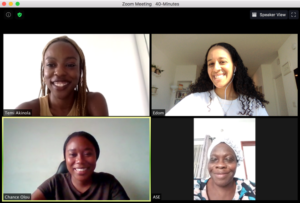
Weekly Check-In with ASE supervisors and my co-fellow!
“The real voyage of discovery consists not in seeking new landscapes, but in having new eyes.”
I believe this quote is very fitting for beginning the fellowship virtually. When applying for the fellowship, I thought my voyage of discovery would be in Benin. In a new landscape. Yet here I find myself writing this month’s Fellow Flyer from my living room. Now, this isn’t to say I am not on my voyage of discovery, because I very much am. Just with new eyes, from my living room!
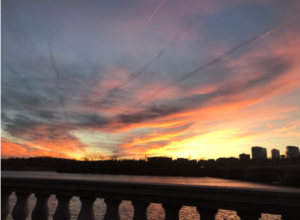
A sunset on one of my walks!
I grew up with this quote as it always helped me view the positive and best outcomes in scenarios. I have been working as a Project Coordinator and Communications fellow at African School of Economics (ASE) located in Benin for 2 months. Although my fellowship voyage has begun in the same location where I first submitted my PiAf application, I did not anticipate to have learned this much about myself and others. Starting this fellowship virtually has definitely had its challenges and exposed me to unanticipated difficulties, yet where challenges lie, there is opportunity for growth.
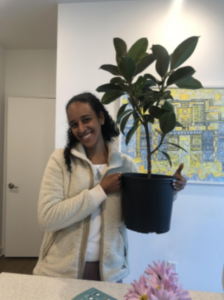
One of my favorite plants- I’ve named her Princess Diana!
As part of the Communications portion of my fellowship, I have been interviewing ASE alumni on links between their experience at ASE and the influence on their career path. During one of the interviews, an alumni explained that when she applied to ASE, she was interested in one program, but the university admitted her into another. After some back and forth, she decided to move forward with it and although it was not something she initially wanted, she explained she was so grateful to have pursued that route as that is where she found her passion. This allowed me to understand that ASE is an institute that wants the best for their students and provides the resources for their student’s success. Also, I think this demonstrates how she was able to take an unanticipated outcome and make the most of it, just like all of the current PiAf fellows. Another part of my fellowship is supporting the Pre-Doctoral Fellowship program by providing guidance and consulting to students applying for their PhD.
During our PiAf orientation, we had a Mindfulness and Resilience workshop which I think about to this day. We had a past fellow speak to us about mental health and ways to practice mindfulness and gratitude during such uncertain times. I am very grateful for that session as I use it as a point of reference often when I feel the walls closing in on me. One of my daily self-care acts is going on afternoon walks to catch the sunset. It’s the perfect time to reflect on my day and taking deep breaths to regroup myself.








